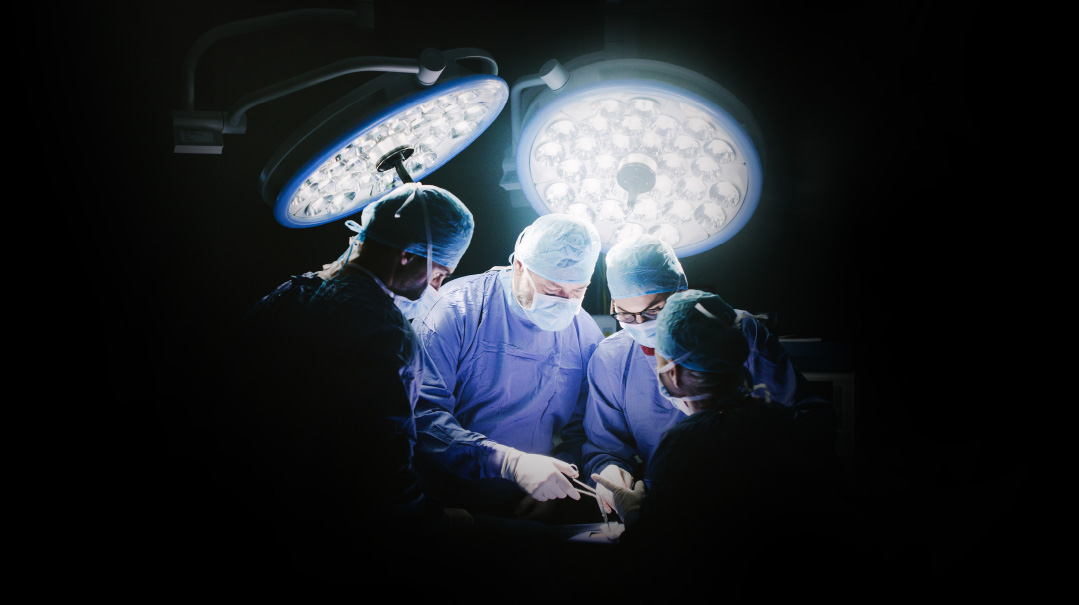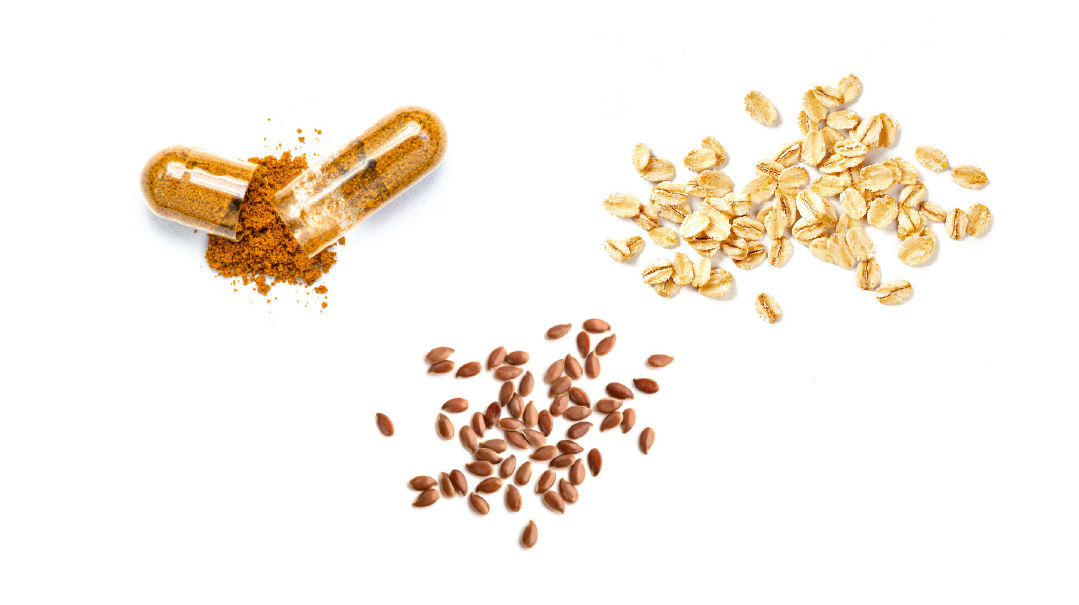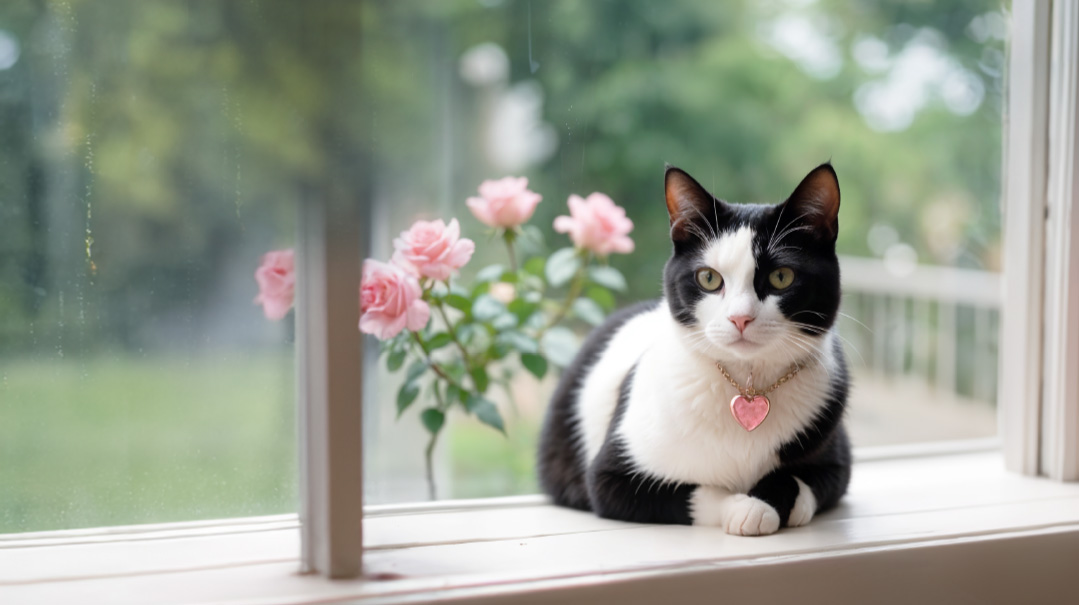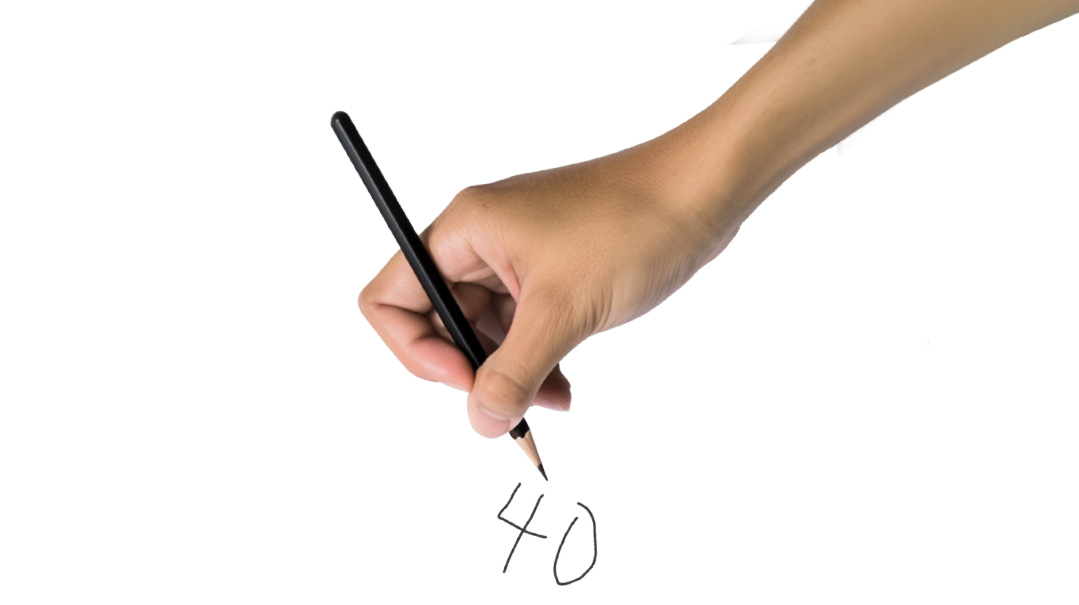Sleight of Hand

Her anxiety morphs into desperation, and her voice takes on an unnaturally high pitch. “But what are the chances?”

T
he surgical mask around my face is a comfort, a fortress, providing steady pressure under my ears where the bands meet my sheitel. I snap the gloves over my hands, struggling as I tug the plastic over my wayward pinky, the one my fellow medical students always poked fun at.
How’d a surgeon with deformed fingers make it this far? Now, their voices are echoes in my head, bringing with them faded insecurities, though not for the reasons they suspected.
“All scrubbed down, Dr. Bergman?” The question is studded with heavy breathing. I nod back at my assistant surgeon, Dr. Kim Lee, who’s still panting from the sprint down the hallway. He flashes a generous smile my way. Running a hand through his gelled, highlighted locks, he inhales deeply. “Glad to have you steering this ship today.”
“Thanks, Dr. Lee. Glad to have you on board.” And I am. He might be cocky, but it’s not without good reason. His beguiling charm hides a brilliant mind, calm demeanor, and steady hand, assets that will be sure to assist me in the operating room.
And flying on my own for the first time as a resident surgeon, I can use all the help I can get.
I do a quick mental review: patient Jason Martinez, 57 years old, in for empyema after developing an infection in the chest cavity. Surgical cut between two ribs, from the front of chest wall to the back, just beneath the armpit. Separate ribs to access the deflated lung. Drain infection, close up ribs, muscles, and skin.
“Danielle, you got this,” I whisper to myself, staring into my pale blue eyes in the mirror. Under the fluorescent bulbs, I look washed out, my crow’s feet more pronounced; my reflection appears far older than my 31 years. But maybe it’s not just the lights.
Under my mask, I crack a wide smile, willing endorphins and serotonin to flood my system.
I continue whispering reassurances to myself, surprised at how nervous I am. I’ve got this, I know I have. I’ve observed hundreds of surgeries, assisted in at least 30 more, and now I’m finally ready to take a more active role as resident surgeon under the general supervision of my attending, Dr. Pescia. And this is considered a fairly simple procedure.
Still, when you’re faced with an open chest, blood and organs and a maze to crack, simple is relative.
I step out into the hallway, pulling my mask down, to give the Martinez family a final debriefing. The eyes that greet me are fearful, expectant, laden with a million unspoken wishes.
“Okay, folks,” I turn towards the patient’s children, “your dad responded beautifully to the anesthesia, and we’re about to go on in. We should be out within a few hours, if everything goes according to plan.” The words I say are tranquil, practiced, and create a soothing ripple of reassurance.
A voice breaks my monologue and the sense of calm. “But Jason, my Jason…” I look at a heavyset, heavily made-up, older woman; Jason’s mother. Intertwined with her thick, bejeweled fingers are rosary beads, which she clutches like hope itself.
“Will he…” A hiccup, she shudders. Her anxiety vibrates like a physical thing, and her voice drops to a whisper. “…be okay?” I ground myself, feeling the floor beneath my sneakers, trying to create an impenetrable field-force from her emotions. In the OR, emotions can’t be given any space.
“If everything goes smoothly, as it should, he’ll be feeling better than he has in months.”
Her anxiety morphs into desperation, and her voice takes on an unnaturally high pitch. “But what are the chances?”
We’ve been through this already, a few times; Jason brought his mother along to every appointment since the initial consultation.
I throw her the most reassuring smile I can, place a warm hand on her plump shoulder. I might need to distance myself to maintain equilibrium, but I can still be empathetic to a worried mother.
“Please G-d, it will all go well,” I respond sincerely. She returns the gesture with a shaky smile of her own, her eyes glassy pools of unshed tears.
I enter back into the antechamber, where Dr. Lee is doing a final scrub-down, and raises an eyebrow in my direction.
“I’ll be one more minute, how you doing?”
“Thank G-d.” Having Dr. Lee, for all his flaws, shoots an extra burst of confidence through my work, and now I answer honestly. “Relatively calm.”
I walk towards the corner, take a deep breath, murmur my favorite perek of Tehillim, kapittel 121, under my breath. I’m so focused on the words: “Im Hashem lo yivneh vayit shav amlu vonav bo,” that I don’t hear Dr. Lee sidle up behind me.
“Everything okay?” he says, giving me a quizzical look. I suppose whispering to oneself twice in a few minutes is cause for alarm. “The psych ward is two floors down…”
“Hardy har. Just sending up a quick prayer. Gotta remember Who’s in charge, right?” I answer lightly.
“I guess,” Dr. Kim responds, an easy shrug punctuating his words. “But you know me, I don’t really believe in a Higher Power.”
There’s not much time to respond, and at the moment, it doesn’t feel prudent to initiate a theological debate. “It’s important to remember we’re just His agents,” I say, as I nod my head upwards, leaving it at that.
“Pretty awesome ones at that.” His confidence is infectious, and I’m getting excited to perform as I feel the adrenaline rush buzzing through my arms.
“We both know we’ve got magic hands,” he continues, waggling his fingers, “even if I choose to remain an agnostic. Guess we’ll just agree to disagree.” He opens the door leading to the operating theater.
And with that final pep talk, we enter. Show time.
The surgery room is calm, the classical music I requested piping through the speakers, creating a serene ambience.
Lay people envision surgery as a frenetic, high-pressured environment; they don’t realize how non-conducive that is to the slow, laborious, steady work that is performing surgery.
I’m familiar with slow and steady; that’s how I plugged through medical school, how I got more serious about my Judaism in university, how I managed in shidduchim. Guys weren’t exactly jumping at the idea of dating a flipped-out surgeon. From the beginning, I made my intentions clear; with daas Torah behind me, I knew, even with my life changes, that becoming a surgeon was a nonnegotiable dream.
Now, as I gently palpate the area, I’m in my zone, and know all these years have been worth it. Saving people’s lives with my hands; what greater good can I offer to the world? True, I’ve often questioned if these hands are capable; but today, with the responsibility solely on me, I’m feeling more confident than I’ve ever felt. Even my self-doubting ten-year-old voice is silent today.
It’s progressing smoothly, I see the infection, delicately slice at the lung tissue. “Drainage tube,” I request, the nurse making it materialize like magic in my hand.
I breathe deeply, immerse myself more wholly in the intricacies of the body lying before me.
Just as I’m about to begin suturing the spot of surgery, just as I’m about to congratulate Dr. Lee on a job well done, that’s when everything goes haywire.
The blood. All I can see is the blood. It’s squirting everywhere, the patient’s vitals drop, and now, now, the surgery room takes on a charged, frenetic air.
One part of my brain is yelling at me to move, do something, find the puncture point, staunch the bleeding, move, move, move.
But the rest of me is rooted in one spot. My ten-year-old self has taken over, frozen in the present, frozen in the past. Everyone continues around me, doctors, somebody (Dr. Lee? Bless him) must have paged “fill the room,” and with everyone swarming around like bees, I remain in place, utterly still. I observe the scene as if I’m hovering slightly above, and see myself, Danielle Bergman, resident surgeon par excellence, completely rigid, no more helpful than a statue.
He’s dead. He’s dying. He’s going to die. I’ll have to tell his family I couldn’t save him. I see myself floating to the Martinez family, see Jason’s mother collapsing into herself, the grandchildren surrounding her in a circle of support and strength.
And then I see her in the silence of the night, where she’ll be, thoughts and memories screaming their haunting tunes. She’ll retreat further and further into herself, with no one able to access her inner workings. I know how death impacts a family.
I slam back into my body, and my breathing is choked, the mask exacerbating my limited intake of breath. I slip it down, take in a deep gulp of air, but my throat feels entirely constricted.
Dr. Lee catches my eye, cocks an eyebrow. I’m sure his expression is telling me the entire story, confirming what I believe I already know. I shake my head stubbornly, I don’t want this to be true: no, no, no.
I killed a man. Instead of saving someone, I killed him. Kill-er, kill-er, kill-er. The thoughts beat in metronome to the patient’s still beating heart.
I can’t watch this; I refuse to bear witness. I can’t be privy to the death of a patient who was a victim of my hands. My history won’t let me.
So I do what seems most logical at that moment: I race out of the OR, leave my discarded scrubs in a heap on the floor of the staff room, and flee the hospital.
“I murdered a man today.”
With my arms alternating between rigid catatonia and uncontrollable shaking, I wasn’t sure I could trust myself in the car. But my body took over on autopilot, and even with my thoughts a jumble, took the route straight to Nathan’s accounting office. Despite the darkness clouding my mind, I could clearly recognize that Nathan, my husband of seven months, was what I needed right now.
Obviously, my cognitive capacities were limited, otherwise I would have certainly thought twice; mornings generally find Nathan in meetings. G-d hadn’t entirely forsaken me, and when I enter the corner office without preamble, Nathan sits at his desk alone. I send my gratitude upwards for this small gift.
Nathan looks up, concern etched between his eyes.
“Repeat that,” his voice is calm, steady. I like calm and steady.
“I murdered a man today.”
He leans forward from his leather chair, catches my eye as he takes a breath; he centers me just with that move. I sit on the padded chair across from his desk.
“No, Danielle, Hashem murdered a man today.” The truth rings clear, and still, I’m struggling with that mindset. I feel the prick of tears in my eyes, allowing myself the luxury of self-pity. Me, Hashem, what’s the difference? All I hear from Nathan is the word “murdered.”
A man died at my hands; these hands… I look at my hands, the pinky, the odd joint that shifts away from the hand, as if in mid-attempt to escape this very body.
Am I destined to repeat my past again and again?
I drive around aimlessly, after Nathan promised he’d be home early. He insisted I take it easy today; I don’t know what that even means. I plug in our home address to Waze to get the fastest route, but the thought of being in our apartment by myself, alone with these thoughts, frightens me. I also can’t imagine going out in public right now, bumping into random acquaintances and feeling forced to make meaningless, inane conversation.
I drive around for a bit, the insistent “Recalculating” from Waze a comforting background noise. I don’t even realize in what direction I’m going until I find myself at Mirror Lake, near the park we sometimes visit.
It’s a large body of water, big enough that in the summer, families come and camp out at the edge, grill barbecues, take out kayaks. The waters stretch as far as the eye can see, and you can almost pretend you’re at the surf of an ocean. There’s a weightless, expansive feel.
Today, the blustery winds keep everyone far away, and it’s just me by my solitary self, with some ducks for company. I lean down, run my fingers across some stray rocks. My fingers search for something I’m not consciously aware of, until the flatness of a stone weighs heavy in my hand. I toss it up gently, the shape and temperature a balm. Holding it between thumb and forefinger, my muscle memory positions the rock for a successful skip.
One, two, three, four, five and the rock sinks, concentric circles rippling outwards. I choose a few more, try to beat today’s score, get as high as 11 before calling defeat to the lake, the rock. I look up at the darkening sky, frustrated at the fruitless game, think about the many ways I occupy my hands.
My hands failed me.
I stick them, hard, underneath me, pressed between body and wooden bench, when I feel the jagged edge of a splinter dig deep. It stings, but something in me is gratified, revels in the stinging pain: I deserve it, these hands deserve it.
I examine the splint of wood in my palm, wonder if these hands will ever heal others. Are they doomed?
I think back to the personal essay I wrote for medical school; it was cathartic to tell my story, and I cried for three mornings straight as I got it down. It was raw and authentic, an account of what led me to the field.
I know now that I was just a kid, that of course when I saw my neighbor hit by a car, it made sense that I froze. But still, the guilt that I could’ve done something as simple as call 9-1-1 haunted me for years. As I got older, I vowed that the hands that had failed to save my neighbor would be used to save others.
I promised myself I would be different, but maybe the misshapen finger has always been an omen. I thought I would use these hands to heal; maybe their fate is set.
I know I can’t push it off forever, and ignoring the messages on my phone is only a temporary respite. I muster up any last remaining ounce of courage, and ask Nathan to drive me over to the hospital. He seems surprised, then relieved, and he grabs the keys.
He knows I don’t have to go to the hospital tonight. I’m not officially on duty, but I need to see my supervisor, Dr. Pescia, and I know he should be around. My pessimistic creativity is taking over, and I prefer a brutal reality to the shady trails of imagination. I can’t delay the ax poised to fall; I’ve worked hard on myself to shift my persona to be more take-charge, the quality I lacked all those years ago.
I push those memories down, down, down, lift my chin to greet the dismissal that is sure to face me. Nathan is quiet on the way over, but as we pull in to the staff parking lot, he looks my way.
“It’ll be good, Dani. These things happen.” Nathan doesn’t think I’m going to be put on probation tonight, but he’s always been my biggest cheerleader. The truth probably lay somewhere in the middle of our extreme perspectives. Right now, though, I think I’m being realistic, not pessimistic.
“It doesn’t happen every day that a doctor loses their patient on the operating table.”
He sighs.
“Are you even certain he actually died?”
I glare his way, no longer feeling he’s on my side. “I was there, remember? There was blood, Nathan, so much blood… There’s no way that patient is still alive.”
“Look, that wasn’t an accusation, I’m here, in your corner rooting for you.” His voice is sincere, filled with belief in me.
I look down, embarrassed by my previous defensiveness. “Why? Why are you still so confident in my abilities?”
“You’re just an agent, remember?”
Familiar words, words I said… words I believed in. It seemed far easier to acknowledge when operating as an agent of healing.
“And Dani, that doesn’t necessarily mean you’ll be able to save everyone. I know that’s why you went into the field…” His voice trails off. As painful as it is to hear, he’s speaking the truth. But the desire to never let a single patient down burns so strong within me, it’s making it difficult for me to acknowledge
The words of Tehillim jump unbidden to my mind: “Esa einai el heharim, me’ayin yavo ezri?”
Ezri me’im Hashem. Only He — Creator of heaven and earth, of body and soul, of sickness and healing — is capable of true salvation.
Maybe I do have a savior complex. I’m now seeing that being in this field will be a constant process of learning and relearning. It will take time and patience to remember that I can only do my best; it’s not in my hands — or any mortal being’s hands — to save everyone. But instead of this knowledge frightening me, as it normally would, I feel a slow trickle of peace, an unfamiliar sensation.
I think about my neighbor, and know in a deep, visceral place that he was meant to die that afternoon, whether or not I ‘d picked up the phone. This awareness is somewhat uncomfortable, but I know it’s like a new pair of shoes: some time, and it will slide on comfortably.
“You’re right. I’m only ever just an agent.” And this time, I send a shaky smile Nathan’s way.
I take a deep breath, exit the car, and enter the hospital to face my uncertain future.
It doesn’t take long to find Dr. Pescia. He’s at the nurses’ station, going over some records.
“Dr. Bergman! Glad to see you finally showed up. I thought you were ignoring my messages.”
I look down, feel a blush creep up my cheeks. “No, no…”
He smiles at me, and I’m surprised by his warmth. “How about we step into my office?” he booms congenially.
I gulp, force back a wan smile. I’m about as eager to enter his office as to walk myself to the gallows, but I force my feet to follow closely behind him. In the hallways, Dr. Pescia keeps up a steady stream of his medical chatter to fill the heavy silence between us. More than his reputation as a world-renowned surgeon, he’s always been a true mensch; I know this is just to save me from the embarrassment that will come one-on-one.
“So Ivanov in room 614 is recovering nicely from his surgery three days ago, I think he’ll be released tomorrow morning, and Anderson in 620 was let out this morning, as I’m sure you know. I looked over his sutures, they healed perfectly, you should have been a seamstress, haha.”
I laugh along weakly. I’d never dreamed of that as a career choice, but then again, I’d never imagined that the door to surgery would be firmly closed in my face.
Finally, we reach the office at the end of the hallway, and he nods toward one of the seats dotting the room. I choose the comfortable armchair directly across from him, and as I sink into the worn cushions, I’m struck by the dichotomy: externally warm, internally frigid. My stomach is a cold pit of anxiety.
“So,” Dr. Pescia’s jovial manner grows serious, as I assumed it would. Although I know he would never give me a dressing-down in front of the other staff, I also know he expects nothing less than perfection from his doctors.
“Dr. Bergman. I’m going to be straight with you, alright?”
I nod, eyeing a chipped corner of the desk, then raise my eyes to meet his. I’ll not go down like a coward. So before he can give me the slip, I realize what I have to do.
“I’m stepping down from my residency. Surgery was a mistake,” I state unequivocally. I surprise myself by how calm my voice sounds.
I’ve never seen Dr. Pescia looking ruffled, even in the most stressful of times, and his expression shocks me. He jerks back, looking aghast.
“Dr. Bergman… Danielle… if you’re going to let something like this determine your career, you’re not nearly the doctor I thought you were.”
Now it’s my turn to pull back; that had not been the response I was expecting. Dr. Pescia’s face is fatherly, which makes me want to cry all over again.
“I heard what happened, I was there right after, and we all know you did your best, that’s how we learn. I know it’s hard to believe, but I’ve made some pretty big bloopers in my career.” He smiles gently, but I can’t smile, I’m still in shock that my job isn’t in a state of limbo.
“And all things considered, this wasn’t that big a blooper.” I’m still processing the previous sentence, and my head is a mess of tangled thoughts. My head feels fuzzy. I don’t seem to be understanding anything right now.
“Look, I’m just saying this to make sure you rid yourself of any notion of dropping out now. Obviously, going AWOL in the middle of an operation could get us all in enormous trouble. Some of my colleagues might even put you on some sort of probation…” My previous act of bravado deflates entirely, and I nod morosely.
“But — and this is a big but — it’s pretty clear to me that something else is going on with you. And I imagine it’s not that you have to desensitize yourself to the sight of blood. I’m sure medical school got you past that.”
I nod, knowing it’s impossible to explain to him that it wasn’t the blood that did it, not at all; it was something that ran far deeper.
“And just walking in tonight and resigning on us, that seems too much like what you did mid-surgery, a whole girly running-off business…” I know this is a reprimand, but raise my eyebrow at the grossly inappropriate comment; we both realize I can go straight to HR with that one. He coughs, blushes, and since I’m still feeling flustered, I just nod.
“You know what I mean. Cut the drama. When the going gets tough, it’s the weak ones who flee. And if I’ve learned anything about you under my eye, it’s that you’re as tough as they come. Prove it to us, Doctor.”
I’ve been effectively dismissed, so I give a grateful nod, still confused by this surprising turn of events. “I’ll see you tomorrow morning. You have another surgery coming up, and I know Dr. Garcia was going to be taking a lead role in this surgery, but instead he’ll be the attending overseeing your performance.”
He nods sharply, his vote of confidence buoying me, and I head toward the elevator to meet Nathan back in the car. We’d planned a nice dinner together; in my mind, a personal pity party. I was looking forward to wallowing in a gazillion calories. Now it looks like it will be a different sort of party.
I press the down button, then quickly retrace my steps back to the nurses’ station.
“Hey, can I see the file for patient Jason Martinez?” They bring it up for me, and I can’t stop my hands from shaking as I reach for it. My pinky jerks wildly; I will it to be still.
I flip toward the back, hear muffled footfalls approaching, but keep my eyes focused on the text, searching for what I’m looking for.
“Dr. Bergman, welcome back! That was quite the disappearing act you pulled on us.” I look up, and Dr. Lee throws me a warm smile, although I notice the crease of concern between his brows. The words wash over me as I scan down to “summary of surgery.”
“Dr. Bergman, I cauterized that vessel in no time. You for sure could’ve done that in your sleep. It’s the performance anxiety that’s a killer, that’s what no one tells med students…” I’m listening with half an ear, not fully processing what he’s saying.
I would normally roll my eyes, it wasn’t exactly performance anxiety — but then again, maybe it was: taking far too much responsibility for executing a perfect performance, when really, perfection resides in G-d’s domain alone.
I bring my eyes to the words I’m searching for, “complications,” and certain phrases pop out at me. Only then do all the disparate pieces of today click into place: “punctured vessel, hemorrhage, blood transfusion necessary.”
I look up, meet him square in the eye. He shrugs. “These things happen, a surprise vein, lots of blood right there on the operating table. We try our best, but you know how these things go, sometimes there are surprises along the way. He’s recuperating now in 626. Even in the best surgeries, things just can’t go as planned; the human body is way too complex to pretend we can save every patient.”
He gives me a warm, comforting smile. “It was a harrowing experience for the family, but all’s well that ends well.”
And then Dr. Lee, avowed agnostic, throws up his hands in a gesture of surrender. “Sometimes, it’s just so clear it’s not in our hands.”
(Originally featured in Family First, Issue 794)
Oops! We could not locate your form.







